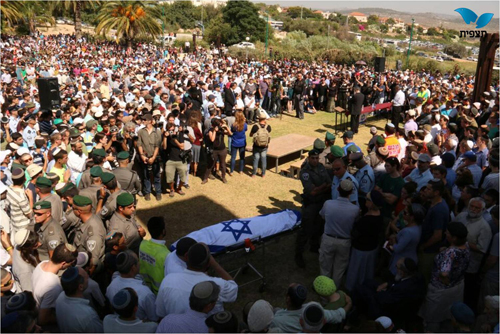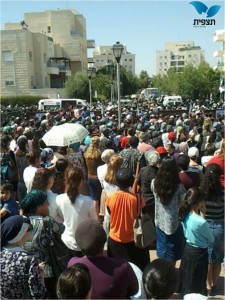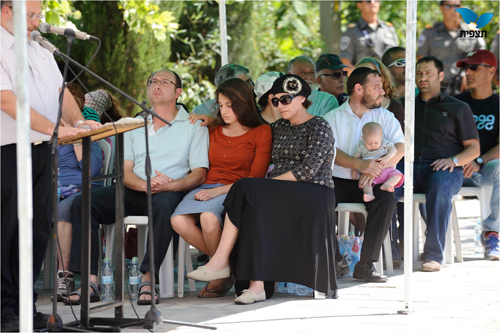

By Anav Siverman and Aryeh Savir
MODI’IN, Israel (TNA) — The families of the three murdered Israeli teens conducted separate services and eulogies before laying their children side-by-side in a joint funeral in the Modi’in cemetery on Tuesday, July 1. Thousands gathered together in the home communities of Gil-ad Sha’ar (16), Naftali Frenkel (16) and Eyal Yifrach (19), whose bodies were discovered on Monday evening not far from the site where they were abducted in Gush Etzion by Hamas terrorists nearly three weeks ago.
Israel’s government ministers spoke at each of the services. Defense Minister Moshe Ya’alon spoke at the service of Eyal Yifrach in Elad. “The song of their lives was stopped. They were kidnapped and murdered just because they are Jews,” said Ya’alon. “Even in these hours, our security forces are looking for their murderers and we will not rest until we find them. Before us stands a cruel enemy, a terror organization that seeks to kill us. But we will not be afraid and they will pay a heavy price.”
“Dear Yifrach family; Iris and Uri, these hours of personal grief are shared by all of us. May their memories, Gilad, Naftali and Eyal, be blessed,” said Israel’s Defense Minister.
“You were such an example to your family. Your brothers are missing you, Eyal,” said the weeping father, Uri Yifrach.
Eyal Yifrach’s grandfather said: “I am convinced that Eyal struggled with the kidnappers with all his strength, to show them that we are not afraid, because he was a hero in his soul, a hero in his love to the Land of Israel, a hero of his love for the people of Israel, and certainly did not go like sheep to the slaughter. I’m sure he gave them what he could to prove that we are in our country, our homeland, and we are confident in the righteousness of our way that the Land of Israel is ours.” Eyal’s father asked his son to whisper in God’s ear and ask him to give them strength to cope. “It is hard without you, we need strength.” he said, “We are loving people, we have the love and it will win. We will not break. We cry, but these are tears of strength. We will not give up. We are here and you can do nothing about it. We are a strong nation.”

Finance Minister Yair Lapid spoke at 16-year-old’s Gil-ad Sha’ar’s service in Talmon and Education Minister Shay Piron spoke at Naftali Frenkel’s service in Nof Ayalon. Both ministers spoke of the unity of the nation of Israel in the face of the heavy tragedy. “We will find the killers and punish them. The real revenge will be in the ability
to bridge the gaps between us,” said Lapid. “We need each other on this day. We need one another, not anger, we need no further split, we need love, a common language,” said Lapid. “We are mourning a life which will not be actualized.”
“I remembered all the times we argued, how you would wake me up in the mornings to go to school,” said Shirel Sha’ar, Gil-ad’s sister with her mother holding her.
“I told the nation of Israel much I will miss wrapping you in my tallit during the blessing of the Cohenim, now that tallit is wrapping your body today,” said Gil-ad’s father, Ophir
Sha’ar, in a breaking voice. “I believe your story will be told for generations. I was able to speak to you an hour before you set home and heard your loving voice. Your sisters loved and were proud of their only brother,” said Gil-ad’s father.
The community of Nof Ayalon gathered together to remember 16-year-old Naftali Frenkel. “Three young boys killed in cold blood, in a shared fate, which in turn can only make us better people. Your death will lead this nation together onwards. Rest in peace my dear son,” said the father of Naftali Frenkel, Avi, in tears.
“Those people were out there to hunt, and you were those chosen,” said Racheli, Naftali’s mother. “We are thankful for the army, police, security forces that you promised to bring the boys back and they did. We will learn to sing without you. We will always hear your voice within us, Naftali.”
*
Anav Silverman and Aryeh Savir are staff writers for the Tazpit News Agency in Israel. They may be contacted via en@tazpit.org.il
We can also say they were murdered because they were non-moslems who were part of a non-moslem state.